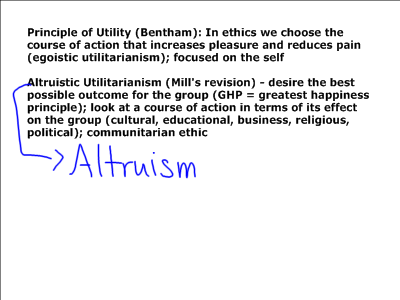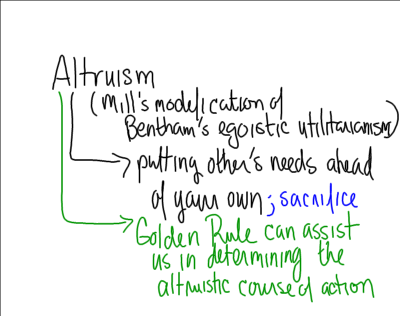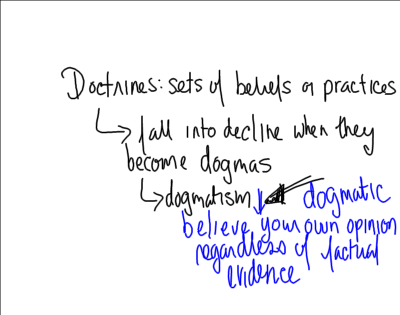Utilitarianism & On Liberty
Here are some web sites that will enhance your understanding of this week’s reading:
John Stuart Mill and Utilitarianism:
- John Stuart Mill Institute: The John Stuart Mill Institute is an independent policy think tank operating in the UK. Its starting point and core philosophy is liberalism, based on the concepts of the freedom of the individual and responsible democratic participation.
- Links to Mill resources: This site provides a get started point for those wishing to read Mill’s texts or learn more about utilitarian philosophy.
- Mill’s texts and more utilitarian resources: This site provides all of Mill’s most famous texts just one click away!
Concepts & Terms to Know:
The following questions are designed to fine tune your understanding of the reading. The subject matter and answers to these questions form the basis of what you will be required to know for exams.
Objectives for this week: These are the learning objectives you should have mastered after attending the lectures and completing the questions below
- Explain Mill’s notion of higher and lower pleasures relating it to his reading of Plato and Aristotle.
- Explain the ways in which Mill modifies Jeremy Bentham’s egoistic utilitarianism to account for altruism.
- Describe Mill’s position on human suffering and the harm principle.
- List Mill’s three principles of liberty.
- Explain Mill’ version of justified belief and describe relevant support.
- Define openmindedness and dogmatism as presented in the reading.
- Explain the connection between public opinion and partial truth.
- Explain the value of dissenting opinion in a healthy democracy.
Terms you should know:
- higher pleasures: “pleasures of the intellect, …relating to our feelings and imagination”; also those relating to our moral values.
- lower pleasures: bodily and physical pleasures
- inferior type: persons who find enjoyment by indulging in the lower pleasures (88-89)
- superior type: persons who find enjoyment by indulging in the higher pleasures
- altruism: personal sacrifice; “putting other’s interests before one’s own”
- incommensurable: (in this case) two things that are incomparable because they are essentially different. Mill uses this word to describe the comparison of pleasure and pain.
Concepts:
Following is an outline of some key concepts from this week’s readings and lectures.
- Although Mill was heavily influenced by Bentham, there are two specific points of the latter’s utilitarian theory that are rejected in Mill’s version:
- Mill did not regard all pleasures equally. He made a distinction between higher and lower pleasures.
- Mill rejects Bentham’s hedonic calculus because he believes that pleasures and pains are incommensurable.
- Higher pleasures are such because they:
- offer a sense of human dignity,
- offer greater permanency, safety, and uncostliness, and
- challenge us to develop our intellectual capabilities.
- The only persons qualified to judge the relative merit of pleasures are those acquainted with the higher pleasures. Mill inserts this qualification so that his ethics can overcome the charge the it is an ethics for pigs and because he argues that anyone who is acquainted with both types or pleasures will certainly affirm the superiority of the higher type.
Egoistic versus Altruistic Utilitarianism |
|
-
Human Suffering: Mill argues that “we have … a moral duty to prevent or to reduce to human suffering.”
- Selfishness and a want of mental cultivation are the greatest causes of unhappiness.
- Individuals who have not taken the time to develop their intellectual capabilities are unlikely to share the view that the improvement of the human condition is of paramount importance.
-
On Democracy:
- Although he favored democracy, Mill sees the possibility for domination of the minority by the majority under a strict system of “mob rule.”
- Accordingly, Mill argues that safeguards be put in place to protect the interests and viewpoints of minorities in the political process. Note that the term minority is not meant to denote racial minorities, but rather all types of political and social minorities that do not share majority/mainstream views.
Guide Questions:
- What are the most desirable ends according to Mill?
- What are the higher and lower pleasures?
- Name three distinct characteristics for higher pleasures.
- Who is a qualified judge for evaluating pleasures?
- Why are the higher pleasures more risky than lower pleasures?
- Does society encourage the cultivation of higher pleasures?
- What is the Greatest Happiness Principle?
- What is the proper approach to dealing with the concerns of others when deciding upon a course of action?
- Summarize Mill’s harm principle. When are we accountable to society?
- When are individuals subject to external control? What are our social obligations to the community?
- List the three principles of liberty.
- Why should we, as an open society, tolerate dissenting opinions? Explain the role of fallibility in encouraging different points of view.
- Why do opinions require justification beyond the scope of belief?
- How does the meaning of a given doctrine fall into decline?
- Mill argues that “in the human mind one-sidedness has always been the rule and many-sidedness the exception.” Explain why he believes this is the case given his discussion of meaning in the previous segment. In other words, how does a doctrine become a one-sided dogma over time?
- What is the connection between public opinion and partial truth?
- Name one instance in which individual liberty can be limited.
- Mill contends that actions which are individually harmful ought not to be controlled except in one circumstance. Identify the circumstance.
- Why should we refrain from imposing the opinion of the majority on everyone?
- What are Mill’s acceptable limits on free trade?








